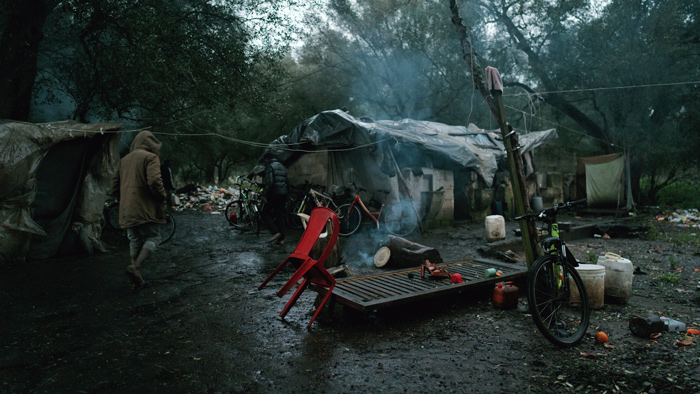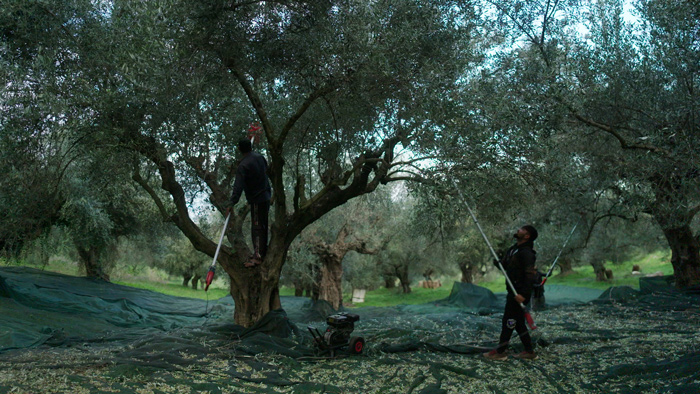The Pickers Film Exposes Food’s Human Cost
Migrant workers do crucial jobs no one else wants. A new documentary asks why they must pay such a high price.
Seydou Arama is an undocumented migrant agricultural worker featured in the documentary The Pickers.
What does an orange cost? An olive? A strawberry? For someone shopping at a European grocery store, roughly what amounts to spare change. But for the one million migrant agricultural workers in Europe, it costs much more. For them, it costs their safety, their security, and their time.
Making its BC premiere at this year’s DOXA Documentary Film Festival, Prix Europa-winning director Elke Sasse’s The Pickers follows an ensemble of migrants steered by the forces of industrial agriculture, capitalism, commerce, and geopolitics, living and working precariously to keep the rest of the continent nourished.
It’s important to see what The Pickers leaves unsaid as much as what it shows in blatant clarity. The film doesn’t directly address the socio-political and cultural roots of why Europe’s farming industry relies on exploiting migrant workers. The word “racism” isn’t uttered once, and there are no heart-pounding sequences of workers enduring torment. Instead, those realities hum quietly in the background, peeking above the surface briefly in worker testimonies and in the meditative B-roll showing their living conditions.
Paying the price
For Kirti Singh Raut, it’s expensive to work.
He says in the film that with “no official process” to get a Portuguese work visa from Nepal, he borrowed €14,000 to pay his way to Portugal and works through an intermediary agency that takes a cut of his earnings. He makes between €30 and €38 a day.
On a phone call with one of these agencies, another Nepalese man named Avinash is shown learning that the market rate for getting work in Portugal is between €11,000 and €15,000, depending on whether he chooses a fast-track option that promises a residency visa in three months.
“I always try to see the whole picture from a very naïve point of view,” said director Elke Sasse on a phone call from Germany, where she’s based. “I think that’s important, because otherwise you get lost in the details. There is work to be done. The countries need workers, so why not give legal access? I think it’s important to ask in this way.”
Seydou Arama lives in a shantytown—a small settlement of huts made from wood and plastic tarps. There’s no running water except the rain Sasse shows breaching the shoddy roof and dribbling into a cleverly placed rubber boot. There’s no heat except the fire pit that Arama feeds with a jerry can of gas. Residents cook for each other and take turns getting groceries.

“How I live here, how I earn my money, they don’t know anything about that,” says Arama about his wife and child back home in Mali.
We meet Arama three weeks into a stint picking oranges in Italy. He’s paid according to how much he can pick in a day. He’s undocumented, so he’s constantly under the threat of inspection. If caught, he could be arrested.
Naveed Qaiser has already suffered some of those consequences. He was arrested in 2019 and spent “14 or 15 months” in jail. But he came right back to work doing what he’s now been doing for eight years: picking olives in Greece.
Qaiser’s situation shows that the current punitive systems don’t actually prevent undocumented work. They just present an obstacle for workers like Qaiser to either evade or suffer through.
Sasse says the film’s participants accepted the risk of being shown on camera because they hoped sharing their stories would motivate change.
The root of the problem
One of the more striking aspects of The Pickers is the bosses’ jarringly matter-of-fact attitudes toward putting migrant employees in precarious situations.
The rise in operational costs has made business difficult for farmers like Sebastiano Navarra, Arama’s employer. “If a producer isn’t earning anything, you either have to exploit the workers… or you don’t pay taxes,” he says. “Otherwise you have to close up.”
Navarra inherited his orange farm from his father, a “true and proper farmer” who “didn’t even know what paperwork was.” Clients usually want to buy large volumes on short notice, so he always needs to have fruit freshly picked. The market price for the inevitable surplus is shockingly low; in the film, Navarra shows an invoice where he was paid €800 for 76 metric tonnes of oranges, or €0.01 per kilogram.
The countries need workers, so why not give legal access?
Kostas Pantazopoulos, Qaiser’s employer, is even more blunt. The workers that are available to him are largely from Pakistan, like Qaiser. But “they are illegal aliens. There is no way to get them legal status,” he says. “The free market has its price.”
As tempting as it is to blame the problem on the farmers, Sasse thinks the onus rests higher up: “There are several reasons for [the farmers’ attitudes], and some of the reasons are the government’s responsibility. If workers are needed in their countries, there should be legal access to the country.”
Bitter fruit
The portrait of European agriculture that The Pickers paints includes the specific harms men cause, and the resulting pain felt by women in the industry. Soumia Elgarrab, a Moroccan woman who worked in the strawberry fields of Spain’s Huelva province for 17 years, now works for the Andalusian Farm Workers Union. In one scene, she listens to an unidentified woman’s testimony of sexual harassment.
“He came up to me and told me that I had to date him,” the woman tells Elgarrab. “I didn’t want to, so he fired me.” Elgarrab listens intently, but she’s not surprised.

Along with such violence, workers face subtle and overt forms of racism. In Greece, Qaiser and his fellow workers are looked at as “poor and miserable people” and are told by restaurant owners that they aren’t allowed on their premises.
Abuse like this is emblematic of the isolation and vulnerability imposed on these workers. It’s intertwined with the housing precarity Arama faces in Italy, the imprisonment Qaiser endured in Greece, and the extortionate prices people like Raut and Avinash pay to get work in the first place. Their treatment doesn’t reflect the importance of the work they do. “They all know they do important work,” says Sasse. “It’s something no one else wants to do.”
Workers at the olive farm in Greece harvest 7,000 olive trees per year. “All of these olives are harvested by Pakistanis,” says Qaiser. “I don’t think it’d be possible without us.”
Budding solutions
Pape Diallo Kan’s experience in Italy provides a refreshing contrast to the other workers’ dire circumstances. Like Arama, Kan used to live in a shantytown, but after being hired at Giuseppe Pugliese’s orange farm SOS Rosarno, he has documents and a full-time contract and can afford decent housing.
SOS Rosarno sells its oranges in Italy for €1.40 per kilogram, which covers wages for workers, processing, and transport. The strategy of selling directly to consumers has enabled the company to set what Pugliese calls “an honest, fair, and transparent price.”
“Rosarno is a totally different concept,” Sasse noted. “Normally, what the market pays, you get. But they turn it around and say, ‘What the workers need, what the farmers need, all this together is the price.’”
If I were president, I’d make sure every worker had rights and was paid according to the law.
“My dream is for one person’s survival not to be dependent on another person not being able to survive,” says Pugliese. The documentary ends with him rejecting the idea that simply following the law should be seen as revolutionary. Real change means workers like Kan shouldn’t rely on luck for fair treatment, and migrants like Arama, Qaiser, and Raut deserve much more.
“If I were president, I’d make sure every worker had rights and was paid according to the law,” says Kan. “Then everything would be cool.”
“With my film, my idea would not be to give an answer,” said Sasse. “It’s just to give this option, and then people whose work it is to organize these things should try to find the solution.”
The film doesn’t examine how sustainable Pugliese’s operation is, or what other solutions are being explored. It does, however, leave us with a sour truth: the roots of exploitation in our food system stretch across the world, from the global south deep into the soil of wealthy countries.
Vancouver’s DOXA Documentary Film Festival runs from May 1–11, 2025. The Pickers (80 min, English, Greek, Italian, Spanish, Bambara, Darija, Urdu, Nepali with English subtitles) screens on May 2 at 5:20 pm at the VIFF Centre and May 3 at 2 pm at the VPL Central Branch. Tickets are available on the DOXA website.
This story was first published on The Green House, our membership platform. Join us there for early access, discounts and freebies, community discussions, and to support our work telling the large and small stories of how we can live sustainably.
